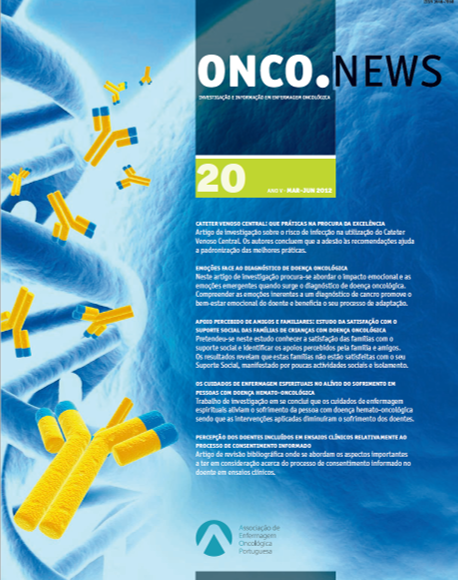Percepção dos doentes incluídos em ensaios clínicos relativamente ao processo de consentimento informado
DOI:
https://doi.org/10.31877/on.2012.20.05Palavras-chave:
princípios éticos, consentimento informado, informação, ensaios clínicos, percepção, tomada de decisãoResumo
Os ensaios clínicos são a fonte para o desenvolvimento de novas estratégias de tratamento. O consentimento informado constitui uma salvaguarda ética para os doentes candidatos a ensaios clínicos, na medida em que reconhece a autonomia nas decisões e o direito à informação adequada. Contudo é necessário garantir que a informação transmitida é devidamente percepcionada, pelo
que devem ser consideradas as variáveis idade, nível educacional e estado de saúde, na medida em que influem no processo de percepção do consentimento informado. Outros factores parecem influir na percepção do consentimento informado, tais como: estrutura e linguagem utilizada nos formulários; outros materiais informativos; ambiente envolvente; tempo dado para a tomada de decisão e a relação de confiança entre investigador – médico e sujeito – doente. É essencial que os profissionais de saúde encontrem estratégias ao nível da informação e comunicação que promovam a compreensão em doentes idosos, iletrados e oriundos de minorias étnicas. Para tal, é fundamental considerar os factores supracitados e conhecer as motivações, expectativas e barreiras quanto à participação dos doentes em ensaios clínicos. Este artigo proporciona uma revisão bibliográfica acerca do processo de consentimento informado.
Downloads
Referências
ÁVILA, P. A Literacia dos Adultos: Competências-Chave na Sociedade do Conhecimento. (2008),
in http://observatorio-das-desigualdades.cies.iscte.pt/index.jsp?page=publications&id=15
AYESH, H. [et al]. Patients’ perception and actual practice of informed consent, privacy and confidentiality in general medical outpatient
departments of two tertiary care hospitals of Lahore. BMC Medical Ethics 2008, 9:14
COMIS R.L. [et al]. Public attitudes toward participation in cancer clinical trials. J Clin Oncol. 2003;21(5):830Y835.
COYNE, C.A. Randomized, Controlled Trial of an Easy-to-Read Informed Consent Statement for Clinical Trial Participation: A Study of the
Eastern Cooperative Oncology Group. Journal of Clinical Oncology, Vol 21, No 5 (March 1), 2003: pp 836-842
CORBETT F., OLDMAN J., LILFORD R. Offering patients entry in clinical trials: preliminary study of the views of prospective participants.
Journal of Medical Ethics, 1996; 22: 227-231
DAVIS, T.C. Informed Consent for Clinical Trials: a Comparative Study of Standard Versus Simplified Forms. Journal of the National Cancer
Institute, Vol. 90, No. 9, May 6, 1998
EDWARDS S.J.L. [et al]. The ethics of randomised controlled trials from the perspectives of patients, the public, and healthcare professionals.
British Medical Journal 1998;317:1209-12.
ELLIS, P. M. Attitudes towards and participation in randomised clinical trials in oncology: A review of the literature. Annals of Oncology 11:
-945. 2000
ELLIS, P. M. Randomized Clinical Trials in Oncology: Understanding and Attitudes Predict Willingness to Participate Journal of Clinical
Oncology, Vol 19, No 15 (August 1), 2001: pp 3554-3561
FERGUSON, P.R. Patients’ perceptions of information provided in clinical trials. J Med Ethics 2002;28:45–48
GOLDIM J.R. Consentimento e Informação: A importância da Qualidade do Texto Utilizado. Rev HCPA 2006;26 (3)
GRAY B. H.; COOKE, R. A., TANNENBAUM, A. S. Research involving human subjects. Science 1978; 201: 1094-1101.
GRUNDNER, T. M. On the readability of surgical consent forms. New England Journal of Medicine 1980; 302: 900-02;
HOOPER K.D., TENHAVE T.R., HARTZEL J. Informed Consent Forms for Clinical and Research Imaging Procedures: How Much Do Patients
Understand? AJR 1995;164:493-496
YOUNG D.R., HOOKER D.T., FREEBERG F.E. Informed Consent Documents: Increasing Comprehension by Reducing Reading Level.
IRB: A Review of Human Subjects Research 12, No. 3 (1990): 1-5
JENKINS V., FALLOWFIELD L. Reasons for accepting or declining to participate in randomized clinical trials for cancer therapy. British
Journal of Cancer (2000) 82 (11), 1783–1788
JOFFE S., [et al].Quality of Informed Consent: a New Measure of Understanding Among Research Subjects. Journal of the National Cancer Institute, Vol. 93, No. 2, January 17, 2001
LAWSON S.L., ADAMSON, H. M. Informed Consent Readability: Subject Understanding of 15 Common Consent Form Phrases. IRB: A Review of Human Subjects Research 17, No. 5-6 (1995): 16-19
LOVERDA M.E. [et al]. Research consent forms: continued unreadability and increasing length. J Gen Int Med 1989;4:410–2.
LYONE N.,[et al].Informed consent: study of quality of information given to participants in a clinical trial. BMJ Vol. 303. 14 September
MORROW, G. How readable are subject consent forms? Journal of the American Medical Association 1980; 244: 5658;
OLVER I.N. [et al]. The adequacy of consent forms for informing patients entering oncological clinical trials. Annals of Oncology 1995;6:867-70
PENMAN, D.T. [et al]. Informed Consent for Investigational Chemotherapy: Patients’ and Physicians’ Perceptions. Journal of Clinical Oncology, Vol 2, No 7 (July) 1984
PRIESTLEY K. [et al]. Are patient consent forms for research protocols easy to read? British Medical Journal 1992;305:1263-4.
SIMES R.J.[et al].Randomised comparison of procedures for obtaining informed consent in clinical trials of treatment for cancer. British
Medical Journal. Vol. 293. 25 October 1986
SIMON C [et al]. Comparison of the Informed Consent Process for Randomized Clinical Trials in Pediatric and Adult Oncology. J Clin Oncol
:2708-2717. 2004
SOOD A [et al]. Patients’ attitudes and preferences about participation and recruitment strategies in clinical trials. Mayo Clin Proc. 2009;84(3):243Y247.
TAYLOR, K.M.,BEZJAK A., FRASER, R.H.S. Informed Consent for Clinical Trials: Is Simpler Better? Journal of the National Cancer Institute, Vol.
, No. 9, May 6, 1998
TAYLOR K.M. [et al]. Fundamental dilemmas of the randomized clinical trial process: results of a survey of the 1737 eastern cooperative
oncology group investigators. J Clin Oncol 1994;12:2769–70.
WANG L. [et al] Intention, Needs, and Expectations of Cancer Patients Participating in Clinical Trials. Cancer Nursing, Vol. 34, No. 2, 2011.
Downloads
Publicado
Como Citar
Edição
Secção
Licença
Direitos de Autor (c) 2023 Maria de Fátima Rodrigues Francisco

Este trabalho encontra-se publicado com a Licença Internacional Creative Commons Atribuição-NãoComercial-CompartilhaIgual 4.0.



